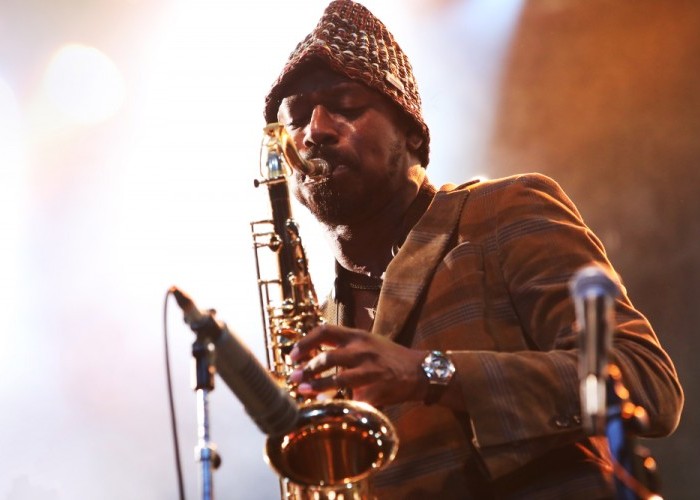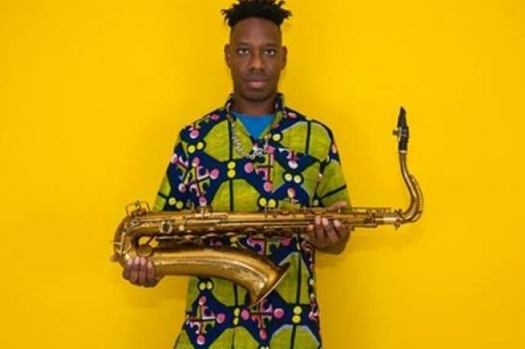Best known for his forward-leaning, high-energy bands, the British saxophonist and clarinetist picked up a flute and found peace. In this TIDAL conversation, he goes inside his ethereal new solo EP, discusses the winding down of his long-running groups, and previews recent sessions with jazz headliners.
In the midst of the pandemic, when the world held its breath and respiratory distress made headlines, Shabaka Hutchings focused on each inhale and every exhale. While we were all locked down, he found freedom.
In London, cut off from his bandmates and fans, he set aside his tenor saxophone and his clarinets and focused on the shakuhachi. Later, when he decided to record this new music, he began by improvising on flute and then playing in response to what he’d just recorded, again and again. He used several flutes, among them a century-old shakuhachi. He played his clarinet and bass clarinet here and there, as well as mbira (African thumb piano), and he invited other musicians in, adding harp, electric guitar and kora (a West African stringed instrument). He sprinkled in the sound of obsidian chimes a friend had given him.
African Culture his new eight-song EP, sounds unlike anything else he’s released. On the opening track, “Black meditation,” Hutchings plays a haunting melody on bass clarinet that floats atop “a sea of flutes,” as he calls it — nine overlaid tracks of him playing shakuhachi. On “Memories don’t live like people do,” his breathy flute passages form an ethereal ensemble. There are duets — clarinet and harp, flute and kora. The music moves gently at times, like flowing water, and at others collects into stunning stillness.
For Hutchings, all this is the start of a new direction. Earlier this month, he announced via social media that after the current Sons of Kemet tour, “we will be closing this chapter of the band’s life for the foreseeable future.” Recently, he brought his flutes and clarinets to Van Gelder Studio, a temple of recorded jazz, and invited friends, including some of jazz’s leading players, to improvise. Those sessions, and others, will be crafted into his first full-length solo LP.
– Yes. That’s where I started to form a love of music. One of the things I think is defining about the island’s musical training, as opposed to England, is that everyone does everything. If you are studying classically, you’ll still probably play at church and you’ll still probably play in the school band that plays calypso and reggae. There’s not this separation.
Comet leans more toward dance-oriented music as a genre. It has a more modern sensibility in that it has more modern technology. Whereas Sons of Kemet leans more toward fundamental African-based music, trying to get down to an essential idea of what music is from that perspective, but then also with other influences taking us away from what you probably associate with traditional African-based music.
Well, that’s a strange issue, in that it’s improvised in terms of how we get the music recorded in the studio. But then the tunes and the tracks are produced in a quite heavy post-production environment. After that, we learn the produced tunes, and they become songs on their own. So weirdly, the Comet Is Coming, which is the most improvised, sounds the most song-like or constructed. And paradoxically, a group like Ancestors, which probably sounds the freest, is the one that’s the most composed.
I had a South African girlfriend. I was spending a lot of time there every year and having all these experiences with musicians. I realized that there was a big and creative scene over there that traced a similar path to mine, but with a different texture of music. With those musicians, I had a different relationship to intensity than I’d had anywhere else.
In general, the musicians I played with in London would have to release the intensity we built up. But in South Africa, they would keep the tension, stay in it. I found that really shocking at first. Normally, I am the person that pushes the intensity further and further. There, I found a whole group of musicians who were with me on that.
It started with just having the time to learn the flute, via the pandemic. I was stuck in London. For the first time in many years I had nothing planned. I had gotten a shakuhachi flute in Japan in early 2019. I could make a sound out of it, but not much more. I knew that there’s a deep history of the instrument, and a way of playing it that’s possible. But because of all the touring, I just hadn’t had the time to explore what that is. Having the time to sit with this instrument and work out a different relationship to my brain and body making sounds has been life-changing.
For one thing, it’s been a breathing exercise. And the main thing it’s taught me is: How do you create energy without tension? The way that a lot of jazz is created, on a technical level, comes from tension. That tension is even in the way that people stand. When you think of the iconography around jazz, you think of someone tensing their body into a shape and then applying more energy to battle the tension that their body’s going through. With the shakuhachi flute, you can’t do that. The instrument doesn’t resonate if your body’s tense. So it’s been a journey of learning how to relax and create enough energy to make that wood vibrate.
Also, at this point in my career, I wanted to stop and think: When do you stop accumulating all this stuff, this technique, and start dealing with more essential ideas of what it is to create music? That’s where the flute comes in, because it’s a psychological instrument. You’ve got to consider: What does it mean to blow this instrument? What does it mean to produce a sound from it?
The album was recorded in the first week of February. I was on a month-long break by the sea in Margate, on the coast of England. I had my mic and my audio interface, and I decided to make a flute album. That’s when I came upon this multi-layered flute technique — doing a foundational solo, and then interacting with it as if I were just improvising with another musician, and doing it up to eight or nine times on different flutes, so that it becomes a sea of flutes.
The first tune, “Black meditation,” started with me recording a 20-minute fundamental solo, and then I did eight more takes interacting with it. Then I recorded a melodic improvisation alongside this on bass clarinet and harmonized it in the studio on clarinet. And then it’s all produced and stripped back into what you hear. It’s a deeply psychological affair. I learned a lot about how to interact with myself.
Yeah. And what I mean by ritual music is that there’s a ritual engaged in the creation of the music. And because of that fact, it means that if the audience is engaging in their own ritual practices, it might aid them. My ritual focuses on the breath, the meditative aspect of it.
Now, the idea of making an album that has meditation at its core kind of sickened me at the beginning, because even just the word meditation brings up this kind of tension in me, about people trying hard to do certain things. I’m not sitting on the floor, cross-legged with palms up. What I tried to do was just to focus as much as possible on my inward and outward breath, and then just try to relax and make music without thinking about it at all.
I’ve actually listened to a lot of it, and I’ve been listening to it recently. It’s interesting that you hear that as an association, because it’s there. I think everything you listen to deeply becomes what you intend to do on some level, even if you’re not conscious of it. You’ve just got to trust the process and act in the moment. And then at some point you listen back and realize: Wow, the overall impression is something very specific. And this one is specifically related to that Pygmy music.
And it won’t happen if I’ve got to then make a different type of music as my main gig and output. I feel like you need to commit to the music that you’re making. You can’t have a band that makes more or less the opposite type of music and then be fully engrossed in making a kind of quieter, more textural music. It can be one or the other. So the only way to do it is to actually wind down the bands. With the Comet Is Coming, there’ll be an album in September, and then we’ll embark on a massive tour. After that, there’ll be a natural break for a while. As far as Ancestors, I haven’t been able to spend more time in South Africa. But I’m looking forward to having time to go there and play with them and rekindle that sense of a band.
The whole thing will need to be theatrical — with built-up sets, maybe almost shrines, and very specific lighting. It will be more of an actual show, as opposed to a band presenting music.








More Stories
CD review: George Benson – Dreams Do Come True: When George Benson Meets Robert Farnon – 2024: Video, CD cover
The band was tight as ever. The Warren Haynes Band cuts loose: Video, Photos
Interview with Alvin Queen: Feeling Good – I heard these tunes played by … Video, new CD cover, Photos